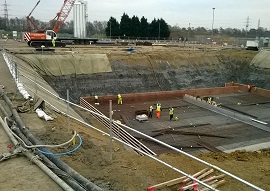Geotechnical engineering
Geotechnical engineering is a practice that relates to the engineering behaviour of the earth and its materials. As a branch of civil engineering it is of great importance to construction activities taking place on the surface or within the ground, as well as to mining, coastal, drilling and other disciplines.
Despite having considerable overlap, geotechnical engineering differs from engineering geology in that it is a speciality of engineering, whereas the latter is a speciality of geology.
Geotechnical engineers are responsible for evaluating subsurface and soil conditions and materials, using the principles of soil and rock mechanics. They are commonly appointed as consultants on construction projects. Engineers also examine environmental issues such as flood plains and water tables. By doing so, they are able to determine whether a particular site is suitable for a proposed project, and can inform the engineering design process with regard to how ground conditions can be made safe and effective for construction.
From geotechnical surveys, engineers will be able to evaluate the stability of the ground, including any slopes and soil deposits, assess any risks and/or contamination, and help to determine the types of foundations and earthworks that will be required. The potential for hazards such as landslides, earthquakes and other seismic activity can also be assessed.
Geotechnical engineers can be involved in ‘ground improvement’, in which soil is treated through a variety of different techniques to improve strength, stiffness, and/or permeability.
Geotechnical engineering is also important in coastal and ocean engineering, in relation to building wharves, jetties, marinas and coastal defences, as well as foundation and anchor systems for offshore structures such as oil rig platforms. Engineers may also work on embankments, tunnels, channels, reservoirs, irrigation systems, and so on.
NB Roles in construction projects: analysis and terminology, by Hughes, W. and Murdoch, J. R, published in 2001 by the University of Reading, defines a geotechnical engineer or geotechnic engineer as a: ‘Consultant with specific responsibility for contributing advice and information on aspects connected with conditions below the surface of the ground.’
[edit] Related articles on Designing Buildings
Featured articles and news
What they are, how they work and why they are popular in many countries.
Plastic, recycling and its symbol
Student competition winning, M.C.Esher inspired Möbius strip design symbolising continuity within a finite entity.
Do you take the lead in a circular construction economy?
Help us develop and expand this wiki as a resource for academia and industry alike.
Warm Homes Plan Workforce Taskforce
Risks of undermining UK’s energy transition due to lack of electrotechnical industry representation, says ECA.
Cost Optimal Domestic Electrification CODE
Modelling retrofits only on costs that directly impact the consumer: upfront cost of equipment, energy costs and maintenance costs.
The Warm Homes Plan details released
What's new and what is not, with industry reactions.
Could AI and VR cause an increase the value of heritage?
The Orange book: 2026 Amendment 4 to BS 7671:2018
ECA welcomes IET and BSI content sign off.
How neural technologies could transform the design future
Enhancing legacy parametric engines, offering novel ways to explore solutions and generate geometry.
Key AI related terms to be aware of
With explanations from the UK government and other bodies.
From QS to further education teacher
Applying real world skills with the next generation.
A guide on how children can use LEGO to mirror real engineering processes.
Data infrastructure for next-generation materials science
Research Data Express to automate data processing and create AI-ready datasets for materials research.
Wired for the Future with ECA; powering skills and progress
ECA South Wales Business Day 2025, a day to remember.
AI for the conservation professional
A level of sophistication previously reserved for science fiction.
Biomass harvested in cycles of less than ten years.
An interview with the new CIAT President
Usman Yaqub BSc (Hons) PCIAT MFPWS.
Cost benefit model report of building safety regime in Wales
Proposed policy option costs for design and construction stage of the new building safety regime in Wales.
Do you receive our free biweekly newsletter?
If not you can sign up to receive it in your mailbox here.


























Comments
Rabio Vegetariano